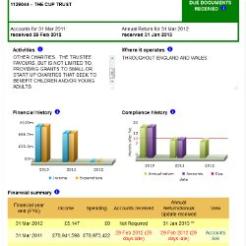The Charity Commission has scoured the Register of Charities and concluded that it does not contain any more charities like the Cup Trust.
This is revealed in the National Audit Office (NAO) report into the Commission's handling of the Cup Trust case, published today.
It states that the regulator reviewed the Register to identify charities with characteristics similar to the Cup Trust, such as low charitable expenditure as a proportion of income.
"It identified potential regulatory issues in 13 chariities and is looking into these issues, but has concluded that it is unlikely that there are charities similar to the Cup Trust on the Register," the report stated.
And although HMRC is looking into eight tax-avoidance schemes that involve charities, the Cup Trust is the only one of these that is registered in England and Wales.
More criticism of the Commission
In its report, the NAO heaped yet more opprobrium upon the Charity Commission over its handling of the Cup Trust case, saying it did not give sufficient weight to the magnitude and nature of the scheme, including the fact that almost all the funds that the Trust planned to give to charitable causes were to come from gift aid, rather than from donors.
It also did not give enough weight to the fact that the value of gift aid claims dwarfed the funds available for good causes, nor the potential for damage to public trust and confidence in charities. It did not even identify as a risk factor the potential conflict of interest arising from the fact that the directors of the charity’s corporate trustee also ran the tax-avoidance scheme.
The Cup Trust operated a complex tax-avoidance scheme which, if HMRC had paid out all the tax reliefs claimed, would have netted the Trust £46m in gift aid since the charity’s inception in 2010. Over the same period, the Trust had income of £176m yet disbursed just £152,292 in grants to charitable causes.
The Charity Commission investigated the Cup Trust in 2010 and 2011 but closed its investigation without taking any action. After the scheme was exposed by The Times newspaper in January this year, the regulator reopened the case and in the spring instigated a statutory inquiry and appointed an interim manager to the organisation.
But the NAO, in its report, concluded that there were issues which “might have justified the opening of a statutory inquiry in 2011, to which the Commission did not give sufficient weight”.
And it “placed too much reliance on the view that tax avoidance schemes were a legitimate activity for charities and that it was for HMRC to pursue tax issues”.
In summary, the NAO said the Commission’s approach to the case was “too passive” and took “too narrow a view of its remit”.
However, it acknowledged that the regulator has already accepted that its decision to close the first investigation was a mistake, and that it is now reviewing its policy on whether tax avoidance schemes should be used by charities at all.
Commission: We are already improving
The Charity Commission did not respond specifically to the Cup Trust report, but it did say, in response to the NAO’s separate report on its effectiveness as a regulator, that it had already taken steps to improve its approach to tackling the most serious cases of abuse and mismanagement in charities.
These steps included increasing the number of statutory inquiries opened; using statutory powers more often to demand information from charities rather than just requesting it, and sharing more information with HMRC.
Sir Stuart Etherington, chief executive of NCVO, agreed with the line taken by the NAO: “In the case of the Cup Trust, the Commission became paralysed by a narrow, legalistic view which demonstrated a real lack of common sense.
“The Commissioners seem to have realised the error of their ways and there is some evidence of progress. The Commission is now making greater use of the legal powers it has to investigate charities, for example. But there is a long way to go. In particular there needs to be cultural change throughout the Commission to take it from a period in which it was expected to be a friend to charities to one in which it must be an effective regulator, focusing on compliance with charity law. The NAO should review progress against its recommendations in 2015.”









